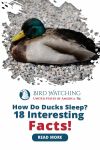
What’s This Post About?
If you step out during the day, you’ll find pigeons everywhere. Both the urban and rural areas, densely populated with humans, inhabit these birds in abundance.
Whether you despise these birds due to their aggravating habits or enjoy their soft coos in the parks, roadsides, and rooftops, they are a prominent urban landscape feature.
As active as they are during the day, these species are nowhere to be seen as soon as the sun sets. This often makes us contemplate the whereabouts of pigeons during the nights.
Pigeons are diurnal birds that go to their warm and hidden shelters at night. These shelters are situated on skyscraper buildings, rooftops, undersides of bridges, and crevices in cliffs, away from the reach of their predators. Even at night, they sleep in a flock as they roost and snuggle together.

Keep reading this post to explore how the pigeons sleep at night. You’ll be surprised to know where the pigeons sleep!
Do Pigeons Sleep at Night?
Like most birds, pigeons are diurnal species. This means that these daylight creatures are most active during the day, carrying out all their activities in bright sunlight.
Foraging on the ground to collect seeds and then feeding on the food, building their nests as well as mating and courtship, all these activities take place when the sun is out.
Prevalent almost everywhere during the day, flying around in yards, foraging on the ground, flocking on the rooftops and parks, one often wonders if the pigeons go to rest at night.

Since pigeons disappear entirely out of sight as soon as the sun sets, it is logically correct to assume that these diurnal birds rest in the night.
Thus, all that pigeons do at night is sleep and roost, rarely coming out in the dark from their safe havens until the sun rises the next day.
Where Do Pigeons Go at Night?
Pigeons do not sleep in their nests.
The most quintessential answer to this question is nests. Most people assume that pigeons go to their nests to sleep during the nighttime; this, however, isn’t true.
Pigeons do not use their nests for sleeping all around the year. Instead, the nests are only built for the purpose of breeding, where they would lay their eggs and raise their young.

Primarily serving the purpose of protecting the eggs and providing the warmth needed by the babies, the nests are only used during the breeding season.
Pigeons wouldn’t ever use it for sleeping after sunset when there is no little one to care for. Click here to learn everything about baby pigeons.
What Do Baby Pigeons Look Like? Where Are They? [15 Pictures]
Inquisitive to find out what baby pigeons look like? Here's all you need to know about the tiny species and why you don't see them too often!
After the breeding season is over and both the parent pigeons have raised their young squabs, which takes a period of 30-40 days, the young grow into independent juvenile species.
These young are now old enough to leave the nests on their own.
Therefore, the adult pigeons abandon their nests, leaving their cozy structures to become leftover messes covered in debris and droppings and find a comfortable and safe place where they could sleep at night.
These pigeons will only sleep in their nests if they have eggs or nestlings in the nests to look after. If they do not have any young to nurse, the pigeons prefer to live in a secluded shelter.

Did You Know?
Pigeons do not entirely abandon their nests. The same pair would return to their nesting site time after time to lay more eggs and raise their young. The pigeons search for a warm and secure shelter to roost during the dark hours of the night.
Any site that offers them protection, such as roofs and walls of homes, trees, building ledges, undersides of bridges, and even the opening of cliffs for the feral ones, would serve as suitable habitats for the pigeons at night.
Did You Know?
Unlike their nesting sites, which can be relatively exposed, these pigeons prefer crammed and concealed spots to sleep.
Apart from meeting their safety requisites, their shelter sites need to be in close proximity to the food sources.

Did You Know?
Pigeons might even create their safe shelter and sleep on the ground if they cannot find any other spot. However, they usually feel more secure on elevated surfaces.
In case you spot a shelter site of pigeons from far away, you might want to use a pair of binoculars to get a better view of it.
Consider purchasing the Vanguard Endeavor Binoculars while ensuring that you do not disturb the pigeons by going near them.
Do Pigeons Stay Alone in The Night?
Pigeons are convivial species usually living in flocks of 50 to as large as 500 of them. Due to their friendly nature, these birds do not like to stay alone or even in pairs.
Even at night, they are likely to find a common shelter where they can roost together, forming large flocks.
A typical pigeon shelter would dwell a large number of pigeons, usually all from the same neighborhood.
Therefore, if you find a pigeon roosting spot, you won’t just find a single pigeon in the shelter. Instead, the pigeons cluster together, huddling close to one another as they rest throughout the night.

Why Do The Pigeons Sleep Together?
These communal creatures like to stick close to one another.
Just like they are found flying around and perched in huge flocks during the day, they roost the same way at night, sleeping with numerous other pigeons in the shelter from the same area.
Living together in flocks and sharing the same shelter gives a sense of protection and warmth to the pigeons, allowing them to roost cozily, snuggling into one another.
This ritual also protects them from the predators that can spot and voraciously attack the pigeons. Pigeons can become a tempting meal for cats, hawks, rats, among many other of its predators.
Living together in a group, pigeons can protect themselves and their companions by alerting each other of any potential danger. By flapping their wings, pigeons can produce an alerting sound which serves as a warning for others.

If one of the pigeons in the flock detects a predator coming at them, the alarm sound of its wings would inform others of the threat, helping them guard themselves or immediately fly away to escape danger.
Do Pigeons Fly at Night?
Precisely, no. Pigeons are not nocturnal species at all. They are only active during the day. In fact, they are known to have poor night vision, which means being in flight in the dark can be hazardous for them.
Ever seen a pigeon fly by rapidly in the midst of the sky in the later hours of the night? Does it make you wonder if pigeons fly at night?
Even though it is rare to spot the bird flying at night, there might be a valid reason that caused the bird to leave the shelter and fly in the night.

Usually quite reluctant to fly at night, pigeons aren’t very courageous birds and choose to stay enclosed in the dark spaces. They never leave their shelter at night unless they’re disturbed or scared away.
Why Might a Pigeon Fly At Night?
Here are some of the reasons why you might see a pigeon flying at night.
- Loud and Sudden noises
Since they live in places close to human activity, such as building ledges, rooftops, and even undersides of bridges, any loud or boisterous noise can scare the birds, interrupting their sleep.
The flock of pigeons resting in such a location might be terrified by the loud noise and fly out of their shelter rapidly in trepidation.

- Outdoor Parties
Just like humans seek to have a peaceful night’s sleep, pigeons also want to sleep well in the night.
However, since their shelters are located close to humans, where large gatherings tend to generate noise, sometimes their sleep is compromised.
If there’s a pigeon shelter near an outdoor event or party with loud music, the pigeons may not be at ease.
They will feel threatened by the loud noises and the presence of humans near them that they would want to escape the shelter due to the feeling of insecurity.

- Predators
If a predator tries to approach the shelter of the pigeons, they might try to escape it and fly out of the shelter at a rapid pace.
Using the sound of its wings to warn and protect other pigeons from danger, the pigeons can protect themselves and immediately fly out in a state of panic.
- Lights
If an area near the resting place of pigeons is left quite well lit till late in the night, it might disturb the sleep of the pigeons since they sleep best in the dark.

What Are the Plausible Dangers of Pigeons Flying at Night?
Since pigeons have poor night vision, taking a flight at night can prove to be quite hazardous for them. A number of risks are associated with the pigeons flying at night.
-
They can crash into dark man-made objects such as building windows, fast vehicles, etc.
-
They have numerous nocturnal predators, so they can easily fall into the trap of cats, dogs, falcons, and owls that actively look for food at night.
-
During extreme winters, the pigeons might freeze and succumb to intense cold weather.
-
Pigeons having lower immunity are less able to survive any accidents or attacks, resulting in their death.

When Do Pigeons Sleep at Night?
Pigeons sleep for an average of 10 hours in the night.
It can be hard to predict the exact time when the bird falls asleep. However, as soon as the sun begins to set, you’ll note that just like other birds flying around, the pigeons also disappear.
As the surrounding begins to get dark, the pigeons move towards their shelter where they roost in groups.
According to studies, diurnal birds go in their safe spots and sleep as soon as it gets dark and the sun fully sets. Thus, they would usually sleep for around 10-12 hours during the night.
How Do Pigeon’s Sleep?
Pigeons sleep in an intriguing style. When sleeping, pigeons adopt a peculiar position, known as cooping, making the bird appear incredibly plump.

They tuck their heads into the feathers of the neck and wings, which gives the pigeons a pretty corpulent look.
At a sudden glimpse of a cooping pigeon on the ledges around, it might look weird, and you might wonder if the bird is sick due to their twisted heads. But the necks of pigeons have an exceptional level of flexibility to adopt this posture.
Not only during the night, but pigeons often do this during the day in broad daylight. This raises the question of whether pigeons are actually sleeping or merely resting?
Like humans, pigeons are among those species that often take power naps during the day - sleeping for a short duration to help them get reenergized.
However, when they do this, they aren’t really in a deep sleep. Instead, you could say they are half sleeping.
You might be contemplating the phenomenon of half-asleep. Pigeons possess a survival mechanism known as unihemispheric slow-wave sleep. As a result, they would never enter into a state of complete unconsciousness during their sleep.

The brains of pigeons are divided into two hemispheres, and each hemisphere controls one side of the body.
When this mechanism is activated, one half of the brain can shut down and sleep while the other remains active, keeping half the body awake. This way, they can keep themselves protected from predators.
Due to this, pigeons have the peculiar ability to literally sleep with one eye open! This might look abnormal to you, but pigeons can rest their bodies while remaining alert at the same time.
Fun Fact
You can't really tell if the pigeon is sleeping or is just resting!
Can Pigeons Be Sleep Deprived?
Pigeons are one rare breed that can never be sleep-deprived!
They are known to be half-asleep almost all the time, with one eye open and half the body active.
Even during the bright daylight, they can rest on the tree branches, rooftops, or building windows whenever they feel like it while simultaneously staying alert.
If they feel a lack of sleep, pigeons go into a deeper sleep to fulfill their need for sleep rather than having to sleep for longer hours.

Fun Fact
They do not need to sleep for hours to satiate their sleep, but simply going into a phase of deep sleep can help overcome the bird's sleep deprivation.
The talons of the pigeons play an essential role in helping the pigeon sleep on the tree branches.
They anchor themselves on to a supporting structure as their strong reflex grip of the talons allows them to sleep comfortably, preventing them from falling even when sleeping.
Does Light Disturb the Pigeons at Night?
Yes, you might disrupt the sleep of the pigeons during the night if there is bright lighting around the shelters where they are sleeping. Too much light in their surroundings might wake the pigeons, and they might fly abruptly, as these diurnal species confuse it with daylight.

Many birds, including pigeons, prefer to avoid sleeping in spaces with a lot of bright light.
These outdoor lights are known to have an adverse impact on the sleep patterns of the birds. The brain activity of the pigeons is severely affected when there are lights around during their sleep.
However, due to immense exposure to lights, city pigeons tend to adapt to this light gradually.
Some can even end up roosting directly opposite to the bright white street lights, while some pigeons are still unable to get accustomed to lights during their sleep, hence having a disturbed sleep pattern.
The consequences of sleep loss in pigeons can be observed in the behavior patterns of the pigeons.
Due to their inability to tolerate light during the night, their development and health are negatively affected, resulting in them reproducing fewer offspring than usual, affecting their potential to forage food as well as ward off predators.
Peaceful night sleep is crucial for the optimal functioning of the bird, so it is forced to find new habitats to sleep conveniently during the night.
Just like it is essential to feed sufficiently, getting proper sleep is also necessary for the birds to thrive.

Did You Know?
According to researchers, pigeons lose out on an average of four hours of sleep when they sleep while exposed to light sources.
In order to help these species of nature sleep well, measures need to be taken to control the intensity of light at places that serve as secure sleeping shelters for pigeons.
-
Switch off your bright porch light
-
Remove decorative lights from trees, terrace, and other outdoor spaces
-
Street lights and park lights should be placed facing the ground
-
Restrict the use of artificial light only when it is needed.
Homing Pigeons - An Exception?
Homing pigeons have an innate ability to fly even in the dark and find their way back even over extremely long distances.
Back in the ages, these species were customarily used as messengers to deliver messages and other information. These pigeons are bred by many pigeon lovers as a hobby today.

Possessing the sense of magnetoreception, the bird’s abilities allow it to navigate the direction properly and safely fly to the right destination.
In addition, unlike other pigeons, homing pigeons can conveniently fly at night, as long as the weather conditions are favorable.
Keep Reading!
Unlike owls and hawks, which are nocturnal animals, pigeons are only active during the day, carrying out all their activities in daylight. As soon as night approaches, the pigeons move to their place of rest.
But unlike the popular opinion that follows, they don’t take shelter in their nests. Instead, they take shelter in highly protected sites, using their nests only in the breeding season to lay eggs and raise their young.
Even during the night, the social birds do not prefer to stay alone, seeking shelter with their fellow mates. It is a rarity to spot these birds flying in the dark, and it can prove to be injurious if they take flight in the night due to their poor vision.
Pigeons have an interesting mating and breeding ritual. Explore our blog to learn if pigeons mate for life.
Do Pigeons Mate for Life? Birds True Love
Very few birds form monogamous, lifelong bonds. Pigeons are one of them! Keep reading to explore more about the endearing, strong bond of pigeons.

By David A. Swanson
Bird Watching USA
My name is David and I'm the the founder of Bird Watching USA! I started Bird Watching with My father-in-law many years ago, and I've become an addict to watching these beautiful creatures. I've learnt so much over about bird watching over the years that I want to share with the world everything I know about them!

David A. Swanson
Bird Watching USA
My name is David and I'm the the founder of Bird Watching USA! I started Bird Watching with My father-in-law many years ago, and I've become an addict to watching these beautiful creatures. I've learnt so much over about bird watching over the years that I want to share with the world everything I know about them!







